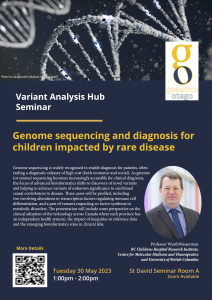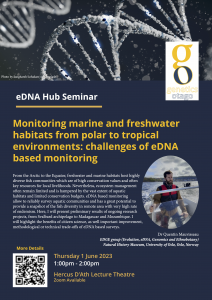Upcoming events hosted by or involving Genetics Otago will be listed here. Please check back regularly for updates. A calendar of events that may be of interest to our members can be found at the bottom of this page and in the sidebar of other pages on this site, please note that this includes events hosted outside of Genetics Otago.
Calendar of Events
The below is a calendar of events hosted by GO as well as events hosted by others that may be of interest to our members. If you have an event you would like us to include please contact us here.
Please note the change in time and venue for this seminar due to the Stop Work meeting being held from 12 – 2 pm on the 9th of May.
It’s a team game: a research journey in infection and immunity
About Professor James Ussher’s research
James is an immunologist and a clinical microbiologist (at Southern Community Laboratories) whose research programme is focussed on the immune response to infection and on antibiotic resistance.
His laboratory is investigating the role of innate-like T-cells in anti-bacterial immunity and how they might be harnessed to prevent infection. They also contribute to several vaccine development projects. In addition, his laboratory uses whole genome sequencing of antibiotic resistant bacteria to identify outbreaks and track transmission pathways to enable interventions.
He is involved in collaborative research projects in New Zealand, the Pacific, Asia, and the United Kingdom.
In response to the COVID-19 pandemic, he co-led the establishment of the Vaccine Alliance Aotearoa New Zealand – Ohu Kaupare Huaketo (VAANZ), a multi-institutional team of researchers and industry focused on building New Zealand’s capability and platforms for vaccine development. He was a member of the Government’s COVID-19 Vaccine Taskforce and is a member of the COVID-19 Vaccine Technical Advisory Group.
Streaming information for Professor James Ussher
This event will be live-streamed, from 5:25pm Thursday 25th May 2023, at the following web address:
This online workshop is delivered by Genomics Aotearoa and NeSI, and will be taught from 10:00am-4:00pm NZT on the Thursday 15th of June, 2023. It is for New Zealand researchers interested in RNA-seq data analysis.
The focus of this workshop is to analyse RNA-seq data with the aim to identify differentially expressed genes.
Some of the topics covered in the workshop are:
– Quality assessment
– Trimming and filtering
– Mapping and read counts
– Differential expression analysis
– Over-representation analysis
Who this workshop is for
This is a beginner-friendly workshop which assumes you are familiar with the basics of R ( e.g., you can copy basic functions like head, tail, or colSums, you are aware of how R stores files as Objects) and bash (e.g., can change directory with cd command, make a new folder with mkdir command, view contents using less command). If you would like a refresher on R you can find one here. If you would like a refresher on bash you can find one here.
Setup
This is a fully online, hands-on workshop. This workshop material will be run on the NeSI High Performance Computing (HPC) platforms – there is no need to install any software for this workshop. Instructions on how to access the NeSI HPC service will be sent out with the confirmation letter to registrants.
The material for this workshop can be previewed here: https://genomicsaotearoa.github.io/RNA-seq-workshop/
Participants must have their own laptops and plan to participate actively. You will require a working web browser.
If you have any questions about these workshops, including whether they are suitable for you, please contact tyler.mcinnes@otago.ac.nz.
Friends in Focus
Dr Nic Rawlence is the Director of the University of Otago’s Paleogenetics Laboratory. He spends his days excavating fossil sites and examining specimens in museum basements, all the while methodically analysing, researching and teaching on Aotearoa’s biggest and tiniest taoka.
With a research background in ancient DNA, the evolution of New Zealand’s extinct biodiversity, and the impacts climate change and humans have had on this prehistoric ecosystem, Dr Rawlence has plenty of insight into a world lost to time.
In this month’s edition of the Friends in Focus talk series, he will dive into what the latest discoveries using ancient DNA can tell us about the evolution of New Zealand’s taoka species and their future in a fast changing world.
Come along and hear from a leading New Zealand expert on this fascinating subject.
12.10pm, Tuesday 20 June
Barclay Theatre
Free – Koha Appreciated
Welcome to ResBaz Aotearoa 2023
40+ free and online digital research skills sessions
Designed for postgraduate students, researchers and those that support them in any discipline – all of the Aotearoa NZ research community
Register for taster and hands-on sessions across a week-long schedule
Look out for local meetups in your institution
Read more about ResBaz
Sessions are free but you must register your attendance via the sessions or schedule lists.
eResearch @ Otago Day
Tuesday 4 July, 9:30am–3:00pm
This eResearch-focused event is free for all University staff and postgraduate students. This year’s event will be held in Room 117 of the Commerce Building (Zoom link available) and will focus on research being undertaken at the University as well as an update on new/upcoming eResearch services:
Short presentations by University of Otago researchers, specialist support staff, and some of our Research IT partner organisations, who are using electronic tools to help solve a variety of research and data management challenges.
Network with University of Otago researchers, specialist support staff, and staff from some of our Research IT partner organisations (REANZ and NeSI).
Learn about some of the IT services available to Otago researchers ranging from: mid-tier compute, HPC on NeSI; the REANNZ network; High Capacity Storage (HCS); the data transfer service and Library data management services.
You are welcome to forward this invitation to colleagues and postgraduate students.
When and Where:
Tuesday 4 July, 9:30am–3:00pm
Room 117 Commerce Building
Zoom: https://otago.zoom.us/j/95977317038?pwd=RHJJbS9BZDQ1ZkI4Y3hkV3N1cEY1Zz09
Meeting ID: 959 7731 7038
Password: 827288
RSVP:
If you’re joining us in person, we’ll start the day with morning tea and a light lunch will also be provided.
Please use the following link to RSVP by 9am on Tuesday 20 June so we can cater for you (https://forms.office.com/r/cZBErnEiya). This is a hard deadline for catering.
If you will be joining us via Zoom only – please still register so we can let you know about any updates and future eResearch events.
If you’re unable to join us on the day, but would like a link to the recorded talks, please email Nicola Walmsley (nicola.walmsley@otago.ac.nz). These will be available for a week after the event.
Questions:
If you have any queries about the event please contact Darren Hart (Manager, Research and Teaching IT Support, darren.hart@otago.ac.nz).
Advanced workshop: human genome assembly using long-read sequencing platforms
Genomics Aotearoa, in collaboration with New Zealand eScience Infrastructure, is piloting an advanced workshop on human genome assembly using long-read sequencing platforms. This is an in-person workshop hosted at the University of Otago, starting in the afternoon of 4 July and ending in the afternoon of 6 July, 2023.
This workshop will be led by members of the Human Pangenome Reference Consortium (HPRC): Ann McCartney (Assistant Researcher, UCSC Genomics Institute) and Julian Lucas (Senior Bioinformatics Systems Analyst, UCSC Genomics Institute). The workshop’s main focus covers read handling, assembly generation, evaluation and curation. The workshop’s scope also includes comparisons between sequence platforms and popular long-read assemblers, examples of good and bad assemblies, and approaches to assembly phasing.
We are seeking your input, to ensure that this workshop is relevant to your research interests and analysis needs. We would like to hear your thoughts on how this workshop could benefit you and what content you would like to see included.
Please complete an expression of interest here to sign up to this workshop, and to share your experiences, feedback and suggestions.
Contact Jian Sheng Boey for further information.



